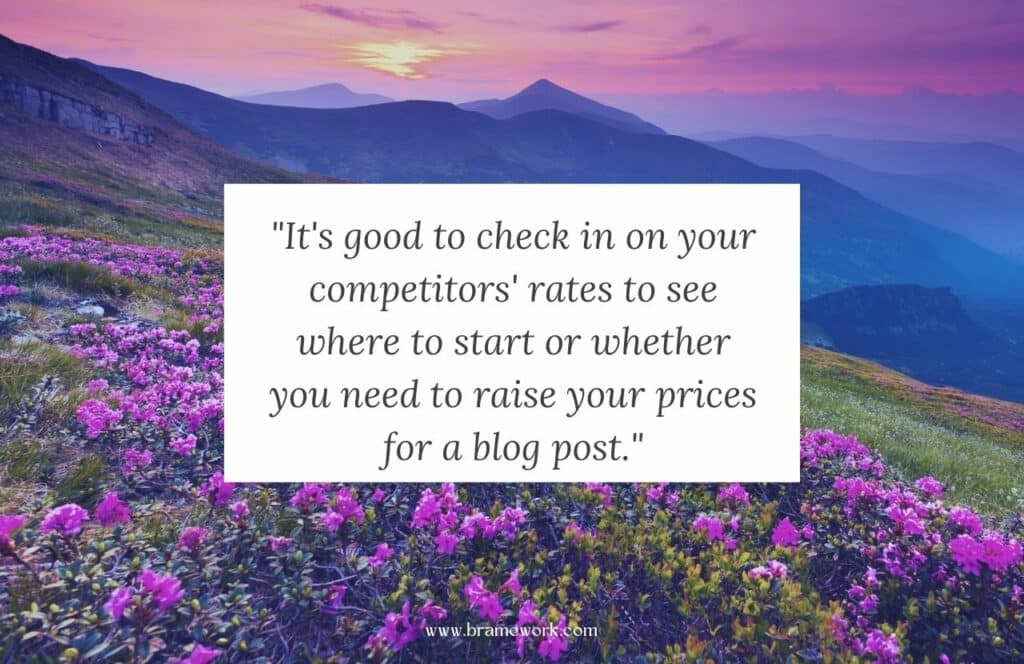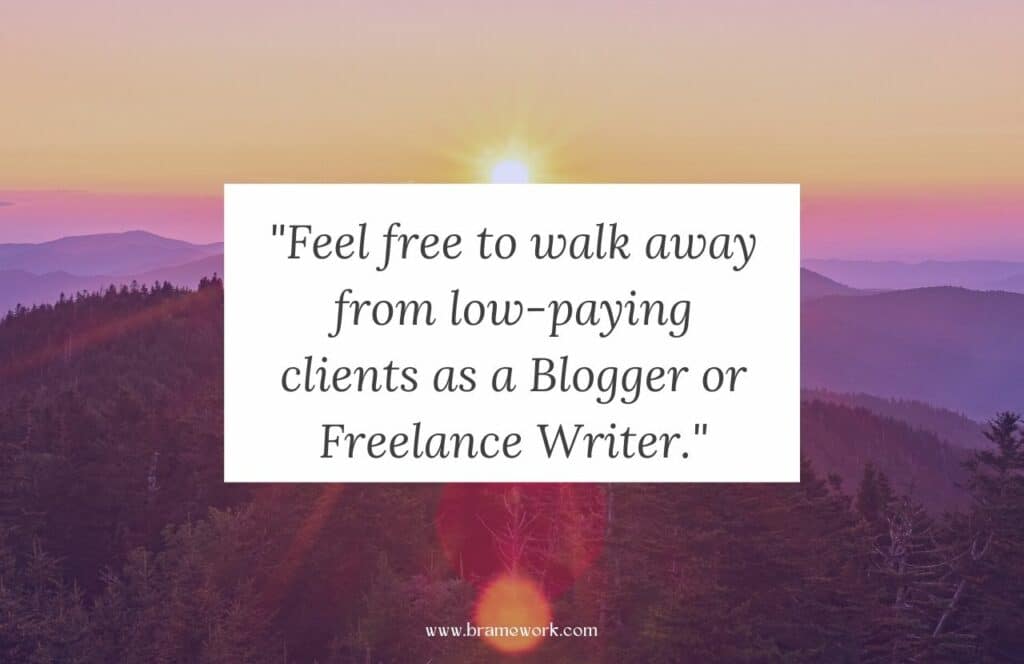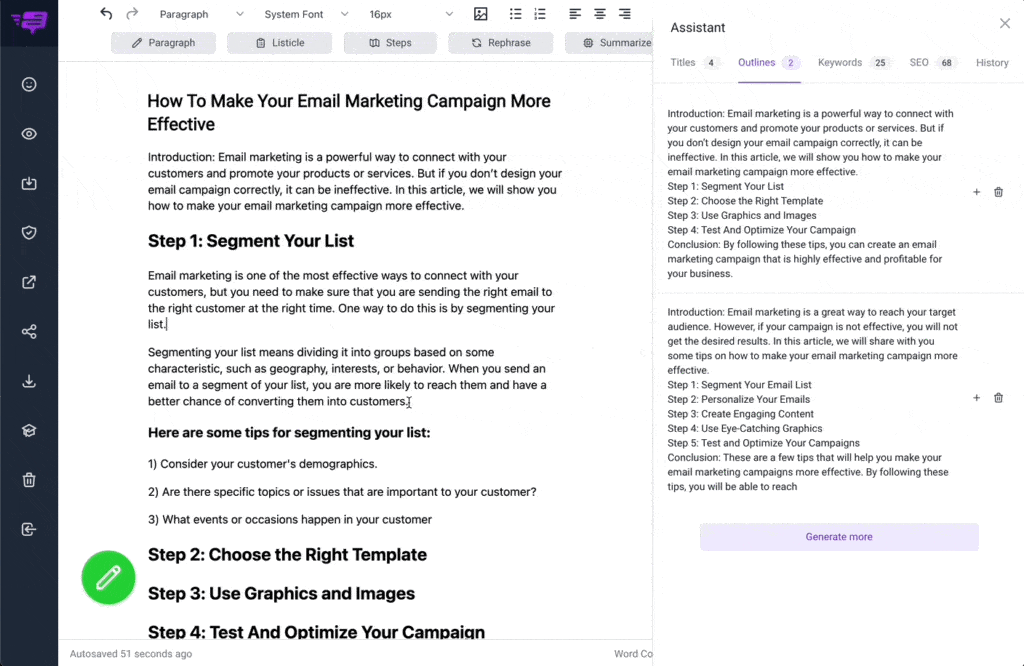DON’T CHEAT YOURSELF: Know How Much to Charge for a Blog Post (Bloggers and Freelance Writers)

Are you stuck trying to figure out how much to charge for a blog post?
Beginning in the online writing space can be intimidating, from considering how much to charge for a blog post to overcoming imposter syndrome. However, pricing out a blog can be a manageable hurdle!
You can base your rate on a few factors, including experience, whether or not you have a niche, and acquired skills.
When considering these factors, it may be easy to undersell yourself when posting a blog post cost for potential customers.
Below, you’ll find a comprehensive guide to help you appropriately price out the cost per blog post and answer the question, “What should I charge as a blogger or freelance writer?”

The Value of Your Writing and Blogging Skills
It’s important to note that your writing abilities are highly valuable online, as the demand is high for professional blog writers and freelancers.
Writing blog posts helps bring in leads, which can convert into sales.
Sales help you or the companies you write for bring in more money. Thus, you play a key factor in the online business space.
What is the difference between freelance writing and blogging?
Understanding the differences between freelance writing and blogging is the first step in deciding how much to charge for a blog post.

A blogger typically writes for themselves or perhaps a company blog or two, while a freelancer writer produces content for multiple clients.
Here’s a more detailed breakdown of the differences for each type of writer.
How is a blogger different?
If you’re a blog writer, you generally work in one niche. Not only that, but you’re also an expert in that niche.

This niche could be anything from food to animals, etc. You get to select your niche, though it’s generally something you’ve already been interested in for many years.
For example, you may love learning about ingredients to avoid in dog foods for a healthier pet.
You can easily turn this into a blog or offer your blog writing services to others that fall into this niche.
There are a few ways to earn revenue if you’re writing for your own blog. These money earning methods include:
- Placing ads throughout your website.
- Creating sponsored posts.
- Selling your own products.
- Linking to affiliate products using content marketing.
How is a freelance writer different?
As a freelance writer, you will write for many clients simultaneously. This could mean writing for clients on one-off orders or writing for returning clients.

You learn to write in various styles for clients when you’re a freelance writer.
It’s a career path that requires you to be more adaptable, as some clients prefer a more professional tone while others want a friendlier, conversational article.
However, you can still have a niche for freelance writing. Some writers focus on travel, sports, health, beauty, etc.
Others Freelance Writers keep their writing topics general so they can write on various subjects.
Either pathway is acceptable, depending on your interests. Whether you have a niche or not, you’ll still need to adapt your writing style to meet your client’s needs, as mentioned above.

Freelance writers get paid per project or via retainer, depending on the clientele. For one-off projects, you’ll get paid per each project.
Sometimes, you’ll have returning clients who pay per project, including article bundles.
You can also set up a contract for anywhere from three to 12 months for returning clients.
This contract provides a retainer noting how much you get paid for x number of hours or articles produced each month.
As you can see, each type of writing career is quite different. Yet, you can still make an income from each type of career.
Are the writing rates the same for a freelance writer and a blogger?
The writing rates for freelancers and bloggers differ due to how you charge for your work. Bloggers typically charge a $0.10 per word fee, then add extra blog post costs based on how many pageviews a post accumulates.

For example, more established bloggers may charge $100 per page view. This extra engagement cost typically applies to sponsored posts.
Freelance writers don’t charge per page view. Instead, there are multiple ways in which freelancers charge. Some charge a flat fee per project.
For example, you may be a freelance writer who charges $50 regardless of whether the blog is 500 words or 1000 words. Other freelance writers charge based on a word count, which is more common.
Charging by word count means you can make higher per-hour amounts, depending on your familiarity with the topic.

For example, if you’re very familiar with a topic, you can write two 500-word blog posts on it per hour.
So, if you charge $25 per blog post, you would make about $50 per hour instead!
Get Your List of Catchy Blog Titles for Free TODAY!
How much to charge for a blog post as a Freelance Writer?
Here’s a quick guide on what to charge per blog post as a freelance writer. Of course, this will depend on whether you have a niche and what your experience and skills are.

If you have a niche, you can charge more as you’re considered an expert in that field.
Beginner Freelance Writers generally start at $0.01 to $0.05 per word. Most mid-tier writers will charge between $0.05 per word to $0.20 per word, depending on experience.
Experts can charge anywhere from $0.25 to $1 per word, sometimes more. Assuming you’re a mid-tier writer, you would charge the below for each word count.
How much should I charge for a 500-word blog post as a Freelance Writer?
The cost of a 500-word blog post would be anywhere from $25 to $100. Usually, those with 5+ years of experience can charge on the higher end.
Keep in mind this pricing is typically for basic blog posts. You can include add-ons like images, expert interviews, etc., for an extra cost.
How much should I charge for a 1000-word blog post as a Freelance Writer?
A 1000-word blog post will be anywhere from $50-$200. Again, you can include add-ons to increase the money you earn per post.
How much should I charge for a 2000-word blog post as a Freelance Writer?
If you create longer content, around 2000 words, you can expect to make $100-$400 per blog post. Based on personal experience, a 2000-word blog post takes about four hours.
This four-hour timeline includes researching, writing, editing, and SEO-optimizing.
How much to charge for a blog post as a Blogger?
As mentioned, charging for blog posts as a blogger is much different than a freelancer as it correlates more toward engagement.

To make it less complicated, you can assume you will make around $0.10 per word as a blogger. This is the average cost per blog writing, even for expert bloggers.

Of course, this does not consider how much engagement you receive or money you’re making from other sources, like affiliate links. Use the below as a baseline for pricing out blog posts.
How much should I charge for a 500-word blog post as a Blogger?
Assuming $0.10 per word, you’ll make $50 for a single blog post. You can make more if you bundle blog posts with social media posts for companies.
However, the pricing for social media captions is much different and usually consists of a flat fee per post.
How much should I charge for a 1000-word blog post as a Blogger?
For a 1000-word blog post, you can charge $100. Of course, if you have more experience, consider adding a few cents more per word. While the average is $0.10 per word, there is some room to negotiate.
How much should I charge for a 2000-word blog post as a Blogger?
You can charge about $200 for a 2000-word blog post. If the post requires you to take photos, consider including an add-on fee, as photography takes additional time.
How much to charge for a sponsored blog post as a Blogger?
Start with $0.10 per word; then, you’ll want to add an extra fee based on your engagement.

Consider adding $100 per 10,000 pageviews that you receive. This cost is a good rule of thumb for those creating blogs.
For example, if you only receive 5,000 pageviews, you can add $50 to your blog post cost.
5 Tips for Setting Your Blog Post Rate
These tips will help set your blog post rate and ensure you earn a profit.
Accepting projects below your minimum rate means you’ll need to take on more projects to make up the difference in earnings.

While that may sound like an okay solution, you’re putting yourself in the position of being overworked and underpaid. This “solution” leads to burnout and lower-quality content.
Instead, ensure you set the correct rate for yourself where you can devote an appropriate amount of time for each project by considering the below tips.
Having enough time to complete each project also leads to high-quality blog content and content creation.
1. Research your competitor’s rates first.
This is the first step for all writers, regardless of whether you’re newer to a writing career or are an established writer with years of experience.

This tip is equal to checking the pay rate for a job on Glassdoor before committing to an interview.
Except it helps establish your base point for rates for your article or blog writing service. It’s good to check in on your competitors’ rates to see where to start or whether you need to raise your prices.
Ensure you check the rates for different platforms as well.
For example, if you’re working through freelancing sites like Fiverr or Upwork, the rate that buyers are willing to pay is generally lower than if you pitch clients and have a funnel set up for your website.

By checking each platform, you can ensure you’re charging an appropriate amount (and one that won’t price you out of projects!).
2. Consider your experience when providing pricing.
Imposter syndrome is the name of the game in freelance work, making it challenging to price yourself at an appropriate rate.
Here’s where tip number one comes into play, you can compare your experience with others and find a blog cost range that fits your personal experience.

Some people will still be lowballing themselves, so take the rates you find with a grain of salt.
You can also charge more for add-ons, like keyword research or SEO writing. Consider this when thinking about how much to charge for a blog post.
Join Bramework’s Affiliate Program and start earning money TODAY!
3. Negotiate your rate.
Don’t be afraid to negotiate! You have valuable skills that many people want to purchase. Once you’ve found a rate range, start with a higher price.

If your buyers note that this blog post cost exceeds their price range, you can offer a lower rate.
Also, if you start at a higher rate, you’ll often still agree on a higher price than you expected, even if you knock a cent or two off a per-word rate.
4. Be confident in your writing and expertise.
Here’s another spot where imposter syndrome rears its ugly head!

Writing is not easy, so if you’re attracting clients and doing well, know that your time, expertise, and skills are valued (and valuable!).
Refrain from underselling yourself because of a bad case of imposter syndrome. Instead, focus on your developed writing skills and how far you’ve come.
5. Feel free to walk away from low-paying clients.
This is one of the most challenging tips, but one that’s worth mentioning. Sometimes you’ll have clients approach you with the promise of more work if you accept a very low rate.

By walking away from low-paying clients, you’re putting yourself first and leaving more room for high-paying clients!
Join the Bramework Facebook Community TODAY!
Final Thoughts on How Much to Charge for a Blog Post
That’s it! You’re ready to get into the freelancing or blogging world and accurately price your services!

Using the above guide, you can price a cost per blog post properly. Now, when a client asks you for your rate, you can answer with confidence.
Remember to avoid underselling yourself and always negotiate your rate!
If you’re still in the beginning stages and need to crank out articles more quickly, you can use Bramework!

Using Bramework, you’ll have the first draft in only a few minutes. Then, you can add your personal touches to create a fantastic blog much more quickly.
So, you can increase your writing output and stay on schedule (that means more money in your pocket!).

Some Photos Courtesy of Canva.com




